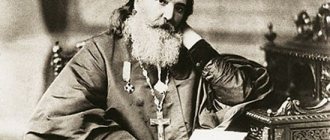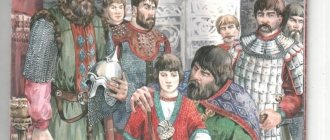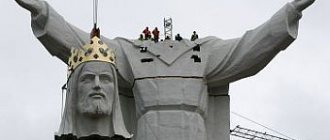In our time, spirituality, unfortunately, is not in first place among the values of young people. Television and computers most often promote violence, a free lifestyle, and entertainment; our peers, in pursuit of pleasure, become addicted to drugs and alcohol, gradually losing their moral foundations.
What can be done to counter this?
We think that faith plays an important role in the life of every person - an important integral component of the life of any person. Faith, like the feeling of love and friendly affection, goes beyond logic (if you can explain why you love, then you don’t love). The area of faith is different from that in which reason operates, but it includes reason, feelings, and will and permeates the entire human essence. A person who believes in God finds meaning in life: he believes in his support and protection, he knows why he appeared on this earth, he is never alone.
Religion is the worship of a Higher Power or higher powers, but it is also a worldview and attitude, as well as corresponding behavior and specific actions (cult), based on belief in the existence of God or gods. That is, religion is not only a worldview, but also a way of life (corresponding behavior). We all know about the 10 commandments by which a believing Christian must live, because they contain the foundations of morality, they lay down the principles without which the existence of human society is impossible. This is a kind of constitution that determines a person’s attitude towards God, towards people, calls for purity of thoughts and desires, for spirituality, i.e., representing maximum freedom in the organization of one’s everyday affairs, the commandments define those boundaries that cannot be crossed without shaking the foundations public life.
In our opinion, Russian literature of the 19th century can play an equally important role in educating the younger generation, since writers in artistic form (in their works of art), being religious people, present their views on the world, relationships between people, and talk about the importance of spirituality in person.
A. S. Pushkin, a symbol of Russian spiritual life, occupies a special place in Russian culture. He is the most famous, recognizable and beloved writer. We get to know him from childhood, discovering his fairy tales, stories, poems, poems. And Pushkin becomes our interlocutor when we talk about the fate of man, about good and evil, about honor and betrayal, love and hatred, cruelty and mercy, and helps us get closer to the truth.
N.V. Gogol said: “Pushkin is an extraordinary phenomenon and, perhaps, the only manifestation of the Russian spirit: this is the Russian man in his development, in which he may appear in 200 years.” And according to A. Grigorovich, “Pushkin is so far the only complete sketch of our national personality.” Indeed, the works of the famous poet reflect the soul, the national character of the Russian people, their consciousness, their religiosity (or lack thereof). If we talk about the importance of religion in a person’s life, if we assert (with good reason) that A. S. Pushkin has a strong influence on the minds and consciousness of our contemporaries, then the question of his worldview, his religious views (directly or indirectly) becomes very important. reflected in the works.
During the years of the Soviet Union, Pushkin was recognized as an atheist (not without reason), so it was convenient for the ruling circles to fight religion. Nowadays you can hear that the poet was a deeply religious person.
Who is right? What was the reason for such polar points of view?
Who really is A.S. Pushkin: an atheist or a believer?
How were his (atheistic or religious) views reflected in his creative heritage?
What does this mean for today's reader?
Different points of view on A. S. Pushkin’s attitude to religion
It is known that Pushkin’s work in our country is loved by the people, his name is surrounded by legends. Some researchers, interpreting the image of Pushkin, reach religious exaltation, calling the poet “Father of our thoughts,” or exclaiming “Pushkin is a religion.” In V. S. Severtsev’s book “The Fate of a Genius” many facts of the writer’s biography are given in a mystical light.
A number of authors generally take Pushkin beyond the framework of culture and rise into the sphere of cult, where the typical signs of all religious cults are preserved: the idea of suffering and sacrifice, sin and atonement. The work of Alexander Sergeevich is optimistic and life-loving, harmonious in form and revolutionary in content, dissolved in abstract moralistic concepts: “sadness”, “hope”, “wisdom”, “overshadowing”. “all-humanity”, etc.
Another point of view: Pushkin and religion are incompatible. Professor of PSU Z. Tarlanov writes: “Recently it has become fashionable to “shape” Pushkin under Orthodoxy, looking for religious motives in him where they are difficult to trace. This matter, however, is in vain. Pushkin was a secular man in everything.” As evidence, the professor cites excerpts from letters that seem to contain criticism (indirect) of the existence of God, and speaks of the “bad erotic poem” “Gavriliad” (1822). A letter written in 1824 played an important role in Pushkin’s enrollment as an atheist. Here is a fragment of this letter: “I read Shakespeare and the Bible, the Holy Spirit is sometimes after my heart, but I prefer Goethe and Shakespeare. You want to know what I am doing: writing motley stanzas of a romantic poem and taking lessons in pure atheism. Here is an Englishman, a deaf philosopher, the only intelligent atheist (atheist) I have yet met. He wrote 1000 pages to prove that there could not be an intelligent Creator and ruler, while casually destroying weak evidence of the immortality of the soul. The system is not as comforting as is usually thought, but, unfortunately, it is most plausible.” The police considered this letter to be indisputable evidence of the author’s godlessness - and this for a long time determined the attitude towards Pushkin as an atheist.
Let us once again carefully read the written lines. Pushkin writes that he is “taking lessons in pure atheism,” but does not say a word about his atheistic views. He speaks of Hutchinson as the first intelligent atheist, from which it follows that the poet has a low opinion of the usual type of unbelief. He reads the Bible, the “Holy Spirit” is “sometimes after his heart.” Finally, the most important thing: the denial of God and the denial of the soul is “a disappointing system” and, “unfortunately, plausible.” In other words, if the poet’s mind recognizes the atheistic “system” as “plausible,” then his heart accepts this conclusion without joy, as “misfortune.”
So who? A. S. Pushkin: atheist or believer? He is tormented by his conscience after writing the poem “Gavriliad”, and he repeatedly renounces it, reads the Koran, the Bible, the Gospel, about which he will say: “This is the only book in the world that has everything.” On the one hand, the impressions of childhood, associated with the spiritual wisdom of the people, with the sincere, simple-minded faith of the nanny Arina Rodionovna, on the other, a secular environment that was not particularly religious.
But in 1817, the poem “Unbelief” was written for the final lyceum exam, where the author describes the tragic hopelessness of the heart of the lyrical hero, incapable of faith. He asks those around him not to reproach, but to take pity on the unbeliever, who “wanders with a withered soul” because he is deprived of “all the supports of his fallen faith.” He is terribly lonely, his “mind seeks divinity, but his heart does not find it,” he “is not destined to know bliss,” because there can be no happiness without faith, but there is no faith.
But in the manuscripts of 1827-28 you can read the following entry: “Not allowing the existence of God means being more stupid than those peoples who think that the world rests on a rhinoceros.”
So is Pushkin religious or not? To come to a common opinion, we decided to research the poet’s biography and analyze some of his works.
Pushkin and religion
Was Pushkin a religious person? What was his attitude towards the Russian clergy and the Orthodox Church, as well as towards Christianity and religion in general? Did he believe in the immortality of the soul and in Providence? The study of these issues is fraught with considerable difficulties. As is known, contemporaries saw in Pushkin a “pure” Poet and, like Baratynsky, they were surprised to find in him not only a brilliant poet, but also a deep thinker. In addition, throughout his life, Pushkin’s views, including on religion, changed. Finally, in modern Russian conditions, this topic has acquired an extremely sensitive character, preventing unbiased, objective research: as has happened more than once in the past, Pushkin has again become an object of ideological confrontation, but if earlier he was seen as a revolutionary and an atheist, now he is often turned into into a deeply believing Orthodox Christian.
After the collapse of the Soviet system in Russia, works on Pushkin by Russian religious philosophers and hierarchs of the Orthodox Church were re-published, dozens of books and articles appeared, conferences and “readings” were held, the purpose of which was to prove that Pushkin was a deeply religious Orthodox poet. Against this background, the serious and well-reasoned works of B. Vasiliev, G. Lesskis, I. Surat and, above all, numerous books and articles by V. Nepomnyashchy stand out. The harmony and consistency of the concept, a deep and subtle reading of Pushkin’s works, brilliant knowledge of his work, temperamental and lively presentation - all this makes Nepomniachtchi the recognized leader of the “religious-Orthodox” trend, which, according to my observations, dominates modern Pushkin studies. Indeed, apart from a very primitive book by B. Maryanov, a substantive study by S. Kibalnik and some cursory critical comments by S. Bocharov and V. Vatsuro, I did not find anything that would oppose this direction. The exception is the sharp article by B. Sarnov, in which the author polemicizes with V. Nepomnyashchy, I. Surat and A. Solzhenitsyn as the main ideologist of the “Orthodox” trend in modern Russian social thought. Oddly enough, there are no serious studies on the topic “Pushkin and religion” in Soviet Pushkin studies. Meanwhile, although V. Nepomnyashchy and his supporters have the undoubted merit of introducing into scientific and journalistic circulation the problems associated with Pushkin’s religiosity and their deep interpretation (it seems that in the heat of polemics B. Sarnov underestimates this), the conclusions of these researchers, in my opinion view are not at all indisputable. Moreover, they seem to me to be largely one-sided and therefore greatly simplify Pushkin’s worldview. Therefore, further discussion of this problem seems to me relevant and justified.
In “A Word about Good Intentions,” V. Nepomnyashchiy admits that when studying Pushkin’s work, one cannot “silence up one thing, retouch another, or push a third with all one’s might,” which, unfortunately, is often found in the works of modern “Orthodox” Pushkinists. He also admits that “Pushkin has few declarations suitable for “Orthodox journalism”, and those that exist <…> can often be interpreted, rather, in terms of philosophical reflection or cultural position than personal confession.” Moreover, Pushkin’s “everyday” and “theoretical” judgments on Christian topics, his creative actions (apparently, we are talking about his works. - F.R.) may be, from an orthodox church point of view, strange, not very literate, sometimes reprehensible." Nevertheless, V. Nepomnyashchy argues that Pushkin’s worldview is expressed not in these “judgments” and “creative actions”, but in the general “spirit” of his work: “... his head can sometimes think one thing, but a genius expresses something completely different...” , for the first belongs to the “worldly, earthly intellect,” and the second to the “heavenly gift.” On this basis, the researcher argues that Pushkin is “the genius of the Orthodox people”, that Orthodoxy, in contrast to Catholicism and Protestantism (atheism, Islam, Judaism, Buddhism, etc. do not count at all), is “the only true faith” and that Russia is the only “stronghold of true Christianity.” This leads to the conclusion about the unique place of Pushkin (and Russia as a whole) not only in Russian, but also in world culture, which, starting from the Renaissance, deviated from the right path and created a secular, materialistic civilization doomed to degeneration and death.
Leaving aside Orthodox-romantic historiosophy, in this article I want to show that although Pushkin’s attitude towards the Russian clergy and the church, towards Christianity and religion in general really changed in the last years of his life, he retained elements of the ancient and romantic worldview, and He did not completely say goodbye to the legacy of the Enlightenment. In my opinion, although Pushkin did become the Russian national poet, this does not mean that he rejected the European cultural heritage and became an orthodox Christian.
EVOLUTION OF THE ATTITUDE OF THE ORTHODOX CHURCH
TO PUSHKIN AND ITS REASONS
It is no secret that Pushkin belonged to that part of the educated Russian nobility of the 1820s and 1830s, which was completely secularized and was indifferent to the church. Of course, he performed church rites, as required by Russian laws, but most likely, especially in his youth, reluctantly and to a minimal extent. In addition, as is known, in Chisinau Pushkin was a member of a very radical Masonic lodge “Ovid”. The situation partly changed in 1824 after the story of the famous letter to Kuchelbecker (?), in which he wrote that he was “taking lessons in pure atheism.” Being exiled to Mikhailovskoye under the spiritual supervision of a priest, Pushkin had to be careful and carefully perform church rituals. This, however, did not change his attitude towards churchism, as evidenced by a letter to Zhukovsky dated March 7, 1826, where he wrote: “Whatever my way of thinking, political and religious (my italics - F.R.), I I keep it to myself and do not intend to madly contradict generally accepted order and necessity.” The situation worsened after Nicholas I released him from exile and placed him under even stricter supervision, so that Pushkin had to strictly fulfill not only court but also church duties and carefully monitor his oral and written statements so as not to arouse suspicions of disloyalty and freethinking, which persisted until his death.
Nevertheless, there is reason to believe that he still remained a non-church person. In his correspondence with friends and acquaintances who belonged to the circle to which he himself belonged, Pushkin never mentions the church. Apparently, he did not feel the need to communicate with representatives of the clergy. The only person to whom Pushkin frequently uses ecclesiastical expressions in his letters is his wife, who, like her family, was apparently much more devout than he was. Pushkin took this into account and observed decency, especially since he knew that his letters to his wife were being illustrated. However, in one of his letters to his wife, he admitted: “I pray to God a little and I hope that your pure prayer is better than mine, both for me and for us” (August 3, 1834). No wonder he called himself a “mediocre Christian.” True, in the last years of his life his attitude towards the church began to change, as evidenced by some of his poems and articles (more on this below), and the fact that after the death of his mother he bought himself a place in the cemetery of the Svyatogorsk Monastery, and, finally, that that before his death he sent for a priest and received Holy Communion. Nevertheless, Nicholas I (and not only he) fully suspected Pushkin of religious freethinking. In his note to the dying poet, the tsar insisted that he meet death as a believing Christian, and later, in a conversation with Zhukovsky, he noted: “... we forcibly brought him to a Christian death...”. It should be admitted that Nicholas I had grounds for such suspicions: Pushkin in his life was never the personification of Christian virtues. This is evidenced by his lifestyle in his youth, and the memories of his contemporaries, and, more importantly, the confessions of the poet himself, the most eloquent of which are “Memories” (1828), “In vain I run ...” (1836) and a number of other poems of the end 1820s – early 1830s.
In his indifferent attitude towards the church and church rituals, Pushkin was far from alone. A. Panchenko rightly notes that in the life of Onegin, Lensky, and even the “Russian soul” of Tatyana, who represent the Russian cultural nobility of the early 19th century, the church did not play a significant role. “Looking around the poetic landscapes and poetic interiors of the novel, St. Petersburg or village, we will not find either a temple or an icon,” he writes and continues: “...judging by “Eugene Onegin,” a man of Pushkin’s circle appears before us in a placenta of religious and church indifference . He does not show disloyalty to Orthodoxy, nor does he show zeal. This is also typical for other works of the poet, if their characters belong to the same circle.”
Of course, such a situation could not please the Church, but it was forced, one way or another, to put up with the indifference of the cultural nobility to religion. Pushkin, however, represented a special case. Although he was only a titular councilor, in the eyes of all educated people he was a great poet, and therefore the Church paid special attention to him. This attention during Pushkin’s lifetime and even for a long time after Pushkin’s death was far from friendly. And the point here is not only in the ill-fated letter about “atheism” and not only in the “Gabriiliad”, for which Pushkin apologized to Nicholas I. Many pastors of the Church until the poet’s death suspected him of secret liberalism and freethinking. Even in Chisinau, Archimandrite Irinei threatened Pushkin with denunciation for blasphemy; In Mikhailovskoye, Pushkin was looked after by the abbot of the Svyatogorsk Monastery, Jonah. But the St. Petersburg Metropolitan Seraphim especially distinguished himself, who first initiated the “case” of the “Gabriiliad”, which spoiled a lot of blood for Pushkin, then, five years after the successful completion of this “case”, he turned out to be the only member of the Russian Academy who voted against the election of Pushkin as an academician, and, finally, after the poet’s death, he did everything possible to ensure that his funeral took place as unnoticed as possible, since from a dogmatic point of view, participation in a duel was considered an attempt at suicide or murder and was equated to a mortal sin.
Usually, when speaking about the attitude of the Church to Pushkin during his life, they refer to the “Response” of the extremely influential Moscow Metropolitan Philaret to Pushkin’s poem “A Vain Gift, an Accidental Gift” (1828). V. Nepomnyashchiy writes that it was “not a reprimand, not even a lesson (?), but advice, admonition, a quiet hint <...> The saint’s poems <...> touched Pushkin deeply not only with wisdom, accuracy in the “diagnosis” of spiritual illness <...> but <...> as the act of a “Christian”, and specifically a “Russian bishop”, as if neither Catholic nor Protestant bishops, by definition, could commit such an act. Filaret’s “answer” is indeed something unusual, but in order to better appreciate it, we must remember what kind of person this outstanding hierarch of the Orthodox Church was and what his ideological positions were.
Many contemporaries, including Pushkin, saw in Filaret a wonderful preacher and theologian, a man with a strong and independent character, but at the same time domineering and intolerant. He was a convinced conservative, had a negative attitude towards secular culture and was ready to come to terms with it only on the condition of its subordination to the Church, that is, its transformation into a means of promoting Orthodoxy as the only true teaching, corresponding to the spirit of the Russian people and the interests of the Russian state. Based on this, he insisted on the removal of the priest G. Pavsky from his duties as educator of the heir to the throne, accusing him of Protestantism, and sharply criticized “German false interpreters of the Bible.” His influence was decisive in the work of the Commission for the development of censorship regulations in 1828, thanks to which, as A. Dmitriev writes, “spiritual censorship, having received the right to control printed publications, took its rightful place as the judge of Russian intellectual life.” Filaret also played a decisive role in organizing the ideological control of the Church over the system of public education: school curricula and textbooks were approved, as a rule, only after his approval. It is not surprising that in the 1860s he expressed skepticism about the reforms of Alexander II, in particular, he objected to the participation of the Church in the process of liberation of the peasants. If we add to all this that, according to Metropolitan Anthony (Khrapovitsky), Philaret had a “rather callous heart”, that even V. Nepomnyashchy admits that he enjoyed a “reputation as a stern and tough man”, as well as what he found sedition even from Krylov and, according to the memoirs of A. Nikitenko, complained in 1834 to Benckendorff against Pushkin for mentioning in Onegin the jackdaws on the crosses of Moscow churches, seeing in this an insult to the shrine, it is unlikely that his “Response” to Pushkin can be perceived as “ a quiet hint" and an expression of "wise tolerance". It was rather a rather strict and intolerant notation. In light of this, Pushkin’s poem “In Hours of Fun or Idle Boredom” does not at all look like the beginning of a dialogue between a secular writer and a church hierarch. Such a dialogue could not take place - the social position of the poet and the all-powerful metropolitan was too different. Nepomniachtchi credits Philaret with the fact that he did not punish Pushkin for the “Gift in vain” (as Sarnov wittily noted, referring to the words from a modern joke: “But he could have slashed”), and he is right in his own way. But it is also, apparently, not worth exaggerating Filaret’s goodwill towards Pushkin: it is quite possible to assume that Filaret, with his “Response,” wanted, having brought the great poet to his senses, to put his gift at the service of the Church, just as Nicholas I wanted to put it at service to the state.
The Church's attitude towards Pushkin began to change only in the 1880s after Dostoevsky's famous speech. Thanks to the “Conversation” of Archbishop Nikanor (Brovkovich), published in 1887, the concept of Pushkin as a “prodigal son” began to take shape in church circles. For the first time, it was recognized at a high level that Pushkin was a poet of genius, but at the same time it was pointed out that, as the Reverend Nikanor wrote, he “not only thought and felt uncleanly, but also acted, and not only acted, thought and felt, but also expressed their thoughts and feelings, aspirations and actions in charming verses,” which made them especially dangerous for believers. “He was a singer, a saint and a slave of this world as much as he was an enemy and denier of another world,” Nikanor continued. And if Pushkin nevertheless deserved, from the point of view of this hierarch, forgiveness, it was because he, like the biblical prodigal son, eventually returned to the bosom of the Church: he repented and died a Christian.
The Church finally accepted Pushkin as a Christian poet in 1899, when, during the celebrations associated with the centenary of his birth, Pushkin was officially declared the greatest national poet. This does not mean that the concept of Pushkin as the “prodigal son” of the Church was forgotten; on the contrary, it was adopted and developed by both Church leaders and Russian religious philosophers of the first half of the 20th century, but the emphasis was rearranged and significant changes were made. The new approach of the Church to assessing the personality and work of Pushkin was first formulated by Metropolitan Anthony (Khrapovitsky) in his “Sermon before the memorial service about Pushkin” and later became traditional. If earlier Pushkin’s “sins” were emphasized, now they were rightly recognized as not so serious, especially since he later atoned for them, and his youthful blasphemies and Voltairianism began to be viewed as consequences of the harmful influence of the secularized secular society to which the poet belonged. On the other hand, from then until the present time, both Church leaders and “Orthodox” Pushkinists interpret Pushkin’s spiritual life as a path to Christianity and Orthodoxy, relying as evidence not only on his “repentant verses”, but also on the entire corpus his works. Expressing this opinion, V. Nepomnyashchy argues that the main thing in Pushkin is not “life” in the sense of everyday biography and not “ideology” expressed in his journalistic statements and letters, but artistic creativity as the struggle of “the higher with the lower, the spiritual with the carnal, the heavenly.” with the earthly." While the former belongs to religion, the latter belongs to positivist science.
If we ignore the extremes and exaggerations into which “Orthodox” Pushkinists sometimes fall, we must admit that there is much justice in their judgments about Pushkin’s spiritual path and work, as well as in their criticism of positivist science. However, in my opinion, one cannot help but notice that they sometimes either ignore or obscure what does not “fit” into their concept. In particular, this concerns Pushkin’s attitude towards the Russian clergy and the Orthodox Church.
PUSHKIN'S ATTITUDE TO THE ORTHODOX CHURCH
It is known that in adolescence and youth this attitude was completely indifferent. In the poem “At the beginning of my life, I remember school,” Pushkin admits that he “did not delve into” the “conversations” of his “stately wife,” by which he clearly means the Church, and “ran away” from them into the “magnificent darkness of someone else’s garden” of ancient art . Although the Law of God was studied at the Lyceum, Pushkin nowhere mentions teachers of this subject. He also does not mention his first meetings with Philaret, later Metropolitan, and then rector of the St. Petersburg Theological Academy, who was present at the Lyceum exams in 1816 and 1817 (the situation with Derzhavin’s visit to the Lyceum was completely different). Judging by “The Town,” where Pushkin describes his library, the Bible was not among his interests at that time. Passion for the ideas of Voltaire and the philosophy of hedonism led to the appearance of a number of anti-clerical poems in Pushkin, such as “The Monk”, “The Mermaid”, “To Ogareva”, etc., as well as the ill-fated “Gabriiliad”, but it is unlikely that Pushkin’s blasphemies of this period (even “Gabriiliad” ") can be considered as serious anti-Godism. In essence, these were, with the exception of the extremely harsh poem “V. L. Davydov" (1821), just youthful "pranks".
For the first time, Pushkin seriously addressed the question of the role of the Orthodox Church and the clergy in the history of Russia in 1822 in “Notes on Russian History of the 18th Century.” These Notes indicate that he had a highly positive assessment of her. He claims that in “Russia the influence of the clergy was as beneficial as it was detrimental in the lands of the Roman Catholics,” since the Russian clergy, unlike the popes, never laid claim to supreme power and “has always been a mediator between the people and the sovereign” (VIII , p. 93). In addition, “the Greek religion, separate from all others, gives us a special national character” (ibid., pp. 92 – 93). And finally, “we owe our history to the monks, and therefore our enlightenment” (ibid., p. 93). Pushkin expresses similar ideas in the article “On the insignificance of Russian literature” and especially in a letter to Chaadaev dated October 19, 1836, where he, disagreeing with his correspondent who believed that Russia received Christianity from an “unclean” (Byzantine) source, writes: “Our clergy, before Theophan, was worthy of respect; they never stained themselves with the baseness of papism,” which led to the Reformation and the collapse of the unity of the Western Church.
All this, however, relates to the role of the Orthodox Church and the clergy in the Middle Ages. As soon as Pushkin moves on to assessing their place in the new, post-Petrine history of Russia and especially in the modern life of the nation, his judgments change significantly and become very critical. This is precisely what “Orthodox” Pushkinists are trying to obscure, believing that Pushkin’s statements should not be taken into account, although they are still relevant today.
What claims does Pushkin make against the modern clergy?
First of all, he criticizes him for conservatism, xenophobia and reluctance to enter into dialogue with secular culture.
- Vasiliev B. A. Pushkin’s spiritual path. M., 1994; Lesskis G. A. Pushkin’s path in literature. M., 1993; Surat I. Pushkin: biography and lyrics. M., 2000; Nepomnyashchy V. Pushkin. Selected works from the 1960s to the 1990s. In 2 vols. M., 2001.[]
- Maryanov B. M. The collapse of a legend. Against clerical falsifications of the works of A. S. Pushkin. L., 1985.[]
- Kibalnik S. A. Pushkin’s artistic philosophy. St. Petersburg, 1993.[]
- Sarnov B. “...And where will you put your hooves?” // Questions of literature. 1994. Vol. IV.[]
- A special place is occupied by V. D. Skvoznikov’s book “Pushkin. Historical thought of the poet" (M., 1999). Skvoznikov shares and in his own way develops many of the ideas of Russian Christian philosophers and cultural scientists of the 20th century, in particular G. P. Fedotov, but at the same time avoids the extremes characteristic of the works of Nepomnyashchy and his supporters. The same can be said about the interesting article by Sergei Davydov “Pushkin and Christianity” // Notes of the Russian Academic Group in the USA / Transactions of the Association of Russian-American Scholars in the USA. 1992 – 1993. T. 25. pp. 67 – 94.[]
- Nepomnyashchiy V.S. Decree. op. T.P.S. 399.[]
- Right there. pp. 397, 398.[]
- Right there. P. 398.[]
- All quotes from Pushkin’s works are given according to the publication: Pushkin A. S. Complete. collection op. in 10 vols. L., 1978, indicating the volume and pages in the text.[]
- L. Craval in the note “Pushkin and St. Seraphim,” following S. Bulgakov, expresses surprise and regret that, although from Boldin, where Pushkin lived in 1830 and 1833, to Diveevo, where St. Seraphim lived in the Sarov Monastery, there were only 65 versts, Pushkin never had a desire to meet him, he “did not hunger for the blessing of the holy elder” (Spiritual worker. A.S. Pushkin in the context of Russian culture. St. Petersburg, 1999. P. 51). To correct this “misunderstanding,” Craval assumes that Pushkin nevertheless secretly saw Seraphim, and as evidence he cites the motif of the “vision” in “Rodrik” (“God sent me a wonderful dream”). These considerations can only cause confusion.[]
- Shchegolev P.E. The duel and death of Pushkin. Research and materials. M., 1987. P. 147.[]
- Panchenko A. M. Pushkin and Russian Orthodoxy. Article one // Russian literature. 1990. N 2. P. 39, 41.[]
- Gift. Russian priests about Pushkin. M., 1999. P. 510.[]
- Spiritual worker. P. 136.[]
- Gift. P. 510[]
- It may be objected: isn’t Pushkin’s poem “In Hours of Fun or Idle Boredom” the beginning of the poet’s dialogue with the Church? V. Nepomniachtchi convincingly rejects the version of Pushkin’s meetings with Filaret and the existence of a draft of the last stanza of the poem, where Filaret is mentioned by name. Drawing a parallel with “The Prophet,” he expresses the idea that “In hours of fun or idle boredom” is addressed not to Philaret, but through his head - to God. This idea seems correct to me. True, the following admission by Nepomniachtchi causes bewilderment: “The poem actually bears the stamp of immediacy, which is not at all characteristic of Pushkin...” (Dar. P. 513). Sarnov also sees in the poem “In Hours of Fun...” “excessive smoothness” and partly “pompousness”, as well as “excessive patheticism,” which, in his opinion, indicate the partial “inauthenticity of the feelings expressed in them” (Sarnov B. Decree op. 76). It is difficult to say whether they are right, because value judgments are a matter of taste. Taking into account the history of the creation of this poem, one really cannot help but suspect an element of “etiquette” in it. On the other hand, the overlap between Pushkin’s response to Filaret and the poem “At the beginning of my life I remember school,” written in the same 1830, is noteworthy. A comparison of these poems, as far as I know, has not been carried out, but it allows us to agree with Skvoznikov, who believes that “In hours of fun ...” is “high meditative lyrics, and not at all a poem “for the occasion”” (Skvoznikov V.D. Decree op. p. 150).[]
- A. S. Pushkin: the path to Orthodoxy. M., 1996. S. 186, 189.[]
- Gift. P. 475.[]
- A remarkable evidence of Pushkin’s respect for the best part of the Russian clergy of the Middle Ages is the image of the wise monk-chronicler Pimen in “Boris Godunov.” The situation is more complicated with the image of the patriarch Job. And the monks Misail and especially Varlaam look absolutely Rabelaisian, for whom the “earthly” principle clearly prevails over the spiritual. It is possible that the prototype of Varlaam was the Mikhailovsky priest and Pushkin’s friend Raevsky, expressively nicknamed “Skoda”.[]
Want to continue reading? Subscribe for full access to the archive.
Get access
Already subscribed? Log in to access the full text.
Research of facts of the biography of A. S. Pushkin
As mentioned earlier, religion is not only a worldview, it is also a way of life (corresponding behavior). What kind of life did A.S. Pushkin lead? After graduating from the Lyceum, Pushkin was enrolled in the College of Foreign Affairs and settled with his parents. He was in turn attracted to the big world, then feasts, then behind-the-scenes secrets. He greedily indulged in all pleasures: balls, gambling, and countless hobbies with women. But at the same time, his long-term friendship with V. Zhukovsky began; in the society where Pushkin visited, serious conversations were held about politics, art, and philosophy. During these years, he created his amazing poem “Ruslan and Lyudmila,” on which “days and nights of extraordinary labor” were spent. In exile (1820-1824), Pushkin continued the same way of life: “playing pranks, playing pranks,” arranging duels, and for the most insignificant reasons, if it came to being infatuated with women, then he went beyond religious dogmas. He cares for married women, and in a letter to A.I. Turgenev he calls his God - Jesus Christ - a “moderate democrat.” He writes evil epigrams, pamphlets, and openly blasphemous poems, which makes it possible to talk about him as an atheist. But both in Chisinau and Odessa, Pushkin does not break away from the social way of life: he carefully attends services, fasts, although he speaks about it jokingly.
Many Pushkin scholars believe that in Mikhailovsky he was able to be himself, think alone, engage in self-education (read 12 carts of books), communicate with ordinary people, and better understand their spirituality. Having become acquainted with the correspondence of A.S. Pushkin when he was in Mikhailovsky, we learned that he, indeed, led a modest, solitary life. He was attracted by the “folk element.” He loved to walk near peasant villages and listen to jokes and songs of their inhabitants; at fairs he was always among the elders (beggars). In a letter to V.F. Vyazemsky we read: “As my only entertainment, I often see a dear old lady neighbor - I listen to her patriarchal conversations.” Pushkin also visits the Osipovs in Trigorskoye, attends services at the Svyatogorsk Monastery every Sunday, loves to talk with Abbot Jonah, drink liqueur with him, but can immediately offer him a “repulsive book” or write an epigram on Vorontsov.
So, Pushkin makes miscalculations, mistakes, does not always behave properly, goes beyond the bounds of worthy behavior, and often deviates from the commandments by which a believer must live. In a word, he is a human being, and therefore does not always follow the norms and requirements prescribed by religious canons. And we accept the poet as he was. He becomes a little closer and more understandable, and appears not as a superman, but as an earthly genius. But the question of faith still remains unanswered, so let’s turn to his works.
Analysis of the works of A. S. Pushkin
Genius, the greatest artist Perhaps there is no author whose reading would bring such peaceful and sublime joy, instills such peace of mind, despite the fact that he poses questions that are sometimes extremely difficult and acutely exciting. Professor K. Zaitsev, later an archimandrite and a famous publicist, believed that poetic creativity “breathes spiritual health.” Where does this “spiritual health” come from? Isn't this connected with the writer's religious consciousness?
At the age of 25 (1824), he wrote one of his great works - the historical tragedy “Boris Godunov” about the troubled times of the century. One of the remarkable images of the tragedy is the chronicler Pimen. He is an active participant in many historical events, a man who loves his land and thinks about its fate. The poet-chronicler, wise by experience, has his own opinion about everything that happens, he fulfills the duty “bequeathed by God”, writes true stories that will remain for posterity. The image of Pimen is the most truthful type of Orthodox Russian ascetic.
Another historical work is the story “The Captain's Daughter”. And although this is a story about the Pugachev uprising, its central plot line is the story of the relationship between Grinev and Pugachev, the story of mercy, kindness, compassion. During the first meeting, the conventional social boundaries between the heroes are erased when the nobleman, addressing the tramp, calls him brother. People who have experienced trouble, almost died, feel a sense of commonality: we are all mortal, everyone’s life is fragile, regardless of rank or age, we all walk under God. As a sign of gratitude, Grinev will give the counselor a hare sheepskin coat, and in this act one can see pity, mercy, and respect for man by man, and this is already one of the commandments - “love your neighbor.” In all their future meetings, mercy will prevail. For only they can repay human virtue and compassion, and Pugachev will give life to the enemy officer, arrange his personal happiness by freeing his bride. The meetings of these people begin with mercy, and end with mercy. One can rightfully say that the religious and moral meaning of the story is clearly visible here.
The poet’s attitude to the world around him changes from year to year, his religious consciousness matures, deepens (strengthens), as evidenced by the following works: “Angel” (1827), “Memory” (1828), “Monastery on Kazbek” (1829) , “Another great important song” (1829), “Memoirs in Tsarskoe Selo” (1829), “Madonna” (1830) “Judith” (1832), “In vain I run to the heights of Zion” (1833), “Spell” (1830) and others.
In the poem “Angel,” the author speaks of a “tender” angel with a “lowered head,” who is capable of causing “heat” of involuntary tenderness even in the “spirit of denial” with his purity. The lyrical hero from “The Monastery on Kazbek” dreams of rising to the “free heights,” “into the neighborhood of God,” but this “shore” is not only coveted, but also “distant,” “slightly visible,” and therefore almost inaccessible. And in the poem “Madonna,” the hero expresses gratitude to the Creator for “sent down” to him Madonna, “the purest example of pure beauty,” which means he gave love and filled life with meaning. The feeling of the divinity of love for female beauty has always been inherent in A.S. Pushkin. Let us remember the poem dedicated to A.P. Kern, where he perceives a woman as a “genius of pure beauty,” and this makes the “heart beat in ecstasy,” for which not only “inspiration, life, tears, love,” but also “divinity” are resurrected " Obviously, a deep religious (spiritual) meaning is contained in the hymn to perfect female beauty: “everything in her is harmony, everything is marvelous, everything is above the world and passions.” The purity of this feeling is emphasized by the poet: “Wherever you rush, even on a love date, but when you meet her, embarrassed, you suddenly stop involuntarily, reverently in reverence for the shrine of beauty.”
At the age of 18, Pushkin wrote the lines: “The mind seeks divinity, but the heart does not find it.” Apparently, his heart has learned to find “divinity”; religion becomes a significant part of his life.
Confirmation of this is the appearance of the poem “The Prophet” (1826) - one of Pushkin’s most brilliant creations, which was written after reading an excerpt from the book of the prophet Isaiah. But this is not a poetic exposition of a passage from the Bible, since the main purpose of Isaiah, who experiences despair at the sinfulness of the people, is to inflict punishment on them “until the cities are desolate.” In Pushkin's "Prophet" the main thing is how a person becomes a prophet, what qualities he must have in order to awaken the conscience of people. The man who dragged himself in the “dark desert” was devoid of spirituality, his life was nondescript, empty. The meeting with the six-winged seraphim gave him the opportunity to become a man with a flaming heart, absolute hearing and vision, making it possible to hear the truth and see the truth. The purpose of the poet-prophet (and art in general) is to awaken and enlighten self-awareness - first of all, the mind and conscience of people, to elevate them spiritually:
Arise, prophet, and see and listen,
Be fulfilled by my will,
And, bypassing the seas and lands,
Burn the hearts of people with the verb.
Then - goodbye, Russia...
— On the issue of teaching Pushkin at school. I remember well how we studied “Eugene Onegin” in the eighth grade according to the principle - I read it and forgot it. At fifteen years old, a person is simply not ready to adequately perceive such a serious work; he does not yet have sufficient life experience or cultural baggage. How should Pushkin be taught to schoolchildren without the risk of alienating them from his poetry for the rest of their lives?
— Of course, teaching “Eugene Onegin” to ninth-graders is pointless. This is a work for older readers. And at fifteen years old, in my opinion, “Dubrovsky”, “The Captain’s Daughter” will be well received... Even “Belkin’s Tales” in the eighth grade will be appropriate simply as amusing plot stories written in beautiful language. Schoolchildren, of course, will not be able to understand their full depth, because even philologists still cannot fully understand Belkin’s Tales. But language is such an element, entering which you certainly change yourself. And this is very important for teenagers.
Photo by Zamir Usmanov/TASS
But in high school, the teaching of serious works by Pushkin, and Russian classics in general, should be predominant. Of course, masterpieces of 20th century literature also need to be taught, this is indisputable. But if we lose the traditions of continuity of classical Russian literature, if the legacy of the great authors of the 19th century is put into a chest and safely forgotten, then goodbye, Russia. Then our traditional mentality will change so much in just two generations that it will be a completely different country. Which, to be honest, is of little interest to me.
It is in the language that lies, so to speak, a certain genetic code of Russian culture, the very concept of “Russianness”. After all, there is no word in any European language that fully corresponds to the Russian concept of “conscience.” There is conscientia, French. conscience, italian. coscienza, English conscience, German Gewissen, but all these words are formed from the root denoting knowledge, all these are words corresponding in the exact sense to the Russian word “consciousness”. And in ancient Greek there is no word for “conscience.” There is even a special work by the largest Russian philologist of antiquity, Viktor Noevich Yarho, which is called “Did the Ancient Greeks Have a Conscience?”, where he very convincingly proves that this concept is absent in ancient Greek literature. There is a concept of shame in front of others, something that V.I. Dahl is defined by the words “reputation, glory.”
In Russian classical literature, the concept of conscience is key and most important for understanding and depicting the Russian character. It is not for nothing that Dostoevsky wrote that even when a Russian person commits mischief, he still remembers that he is misbehaving. In the classical works of Russian literature there is a certain hierarchy of values, a vertical dimension of existence. And now this vertical has been abolished both in life and in culture. Only horizontal connections remain. All postmodernism is based on this principle, where all works are located on the same plane and are separated from each other only by distance, and not by hierarchy. Here is an example: the late Dmitry Aleksandrovich Prigov, may he rest in peace, rearranged “Eugene Onegin” in his own way by using two words - “mad” and “unearthly”. Instead of all Pushkin’s epithets, he inserted these “mad” or “unearthly”, depending on the rhythmic structure of the poem. And for some reason he considered this his great artistic achievement, he was very proud of it.
Therefore, I repeat, the state of Russian culture today seems to me very, very deplorable. All that remains is to believe in the truth of Chaadaev’s words that the Russian people do not belong to nations that develop according to normal human logic. Our development occurs according to the supreme logic of Providence. Who knows, maybe time will pass and everything will change, despite the current sad circumstances. It’s just a pity that modern Russian boys and girls, so smart, talented, free, can deprive themselves of this priceless treasure - classical Russian literature, which our generation managed to preserve and carry through all the horrors of the history of the 20th century.
It’s not Pushkin that I feel sorry for now. I feel incredibly sorry for the people who grow up and live without it. Because they lose such values, without which it is very difficult for a person to remain human.










